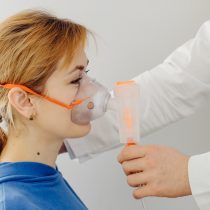
A recent study published in Springer Magazine in Switzerland warns that Obstructive Sleep Apnea/Hypopnea Syndrome (OSAHS) could be a risk factor if Covid-19 is contracted, so keeping the effects of this sleep syndrome under medical control may be beneficial in reducing the risks of Covid-19 if you develop it.
This is an issue that affects many Chileans because, according to 2017 data from the Chilean Journal of Respiratory Diseases, almost 20% of chile’s population has sleep apnea as a base health condition. In addition, according to figures from the latest National Health Survey, 63% of the adult population snores, a condition that in most cases derives from SAHOS.
In this regard, bronchopulmonary Maury Bracho, of Clínica Somno, notes that “episodes of sleep apnea occur mainly due to narrowness in the pharynge, which can produce a turbulent flow, trigger snoring or clog the passage of air during sleep. This, in addition to covid-19 could increase the triggering of other diseases such as hypertension, cardiac arrhythmias, cardiovascular infarctions, among others.”
It is also known, thanks to a study published by the journal CHEST in 2009, that 88% of patients with Idiopathic Pulmonary Fibrosis have SAHOS. This knowledge leads scientists to consider that patients who suffered from a severe case of Covid-19 may be at risk of subsequent sleep apnea, a product of pulmonary fibrosis that triggers this new coronavirus known as SARS-CoV-2.
“This analysis alerts the monitoring and control of patients who have had coronavirus and may be experiencing sleep disorders today, as sleep apnea can be treated early by avoiding the onset of new diseases such as High Blood Pressure and Diabetes Mellitus, which worsen quality of life and increase the risk of serious health problems,” explains clinic specialist Somno.
But what is SAHOS or sleep apnea really? They are respiratory pauses that have a minimum duration of 10 seconds, where the airflow is completely interrupted, being able to last more than 60 seconds, generating serious health consequences.
If apneas are very common, the affected person will stay much of the night with low blood oxygen concentrations, affecting their sleep quality.
This pattern can be repeated 5 to 30 times throughout the night, and in some severe cases up to more than 100 times, making it difficult to reach the deep and restful stages of sleep. In addition, apneas create risks for their possible secondary complications, however it is easy to diagnose and usually the patient responds positively to treatment, substantially changing their quality of life.
"El reclamo puede ser genuino, pero construido sobre una mentira", apuntó el presidente Javier Milei…
El gobernador de la provincia de Buenos Aires, Axel Kicillof, encabezó un acto en Ensenada…
El diputado nacional de La Libertad Avanza, José Luis Espert, expresó su confianza en la…
Tras la masiva reaparición de Cristina Fernández de Kirchner, el presidente Javier Milei apuntó contra…
El principal propósito de la nueva comisión es evaluar los recursos humanos en el Senado,…
En una medida que busca redefinir las condiciones de los seguros de automóviles en Argentina,…
Esta web usa cookies.